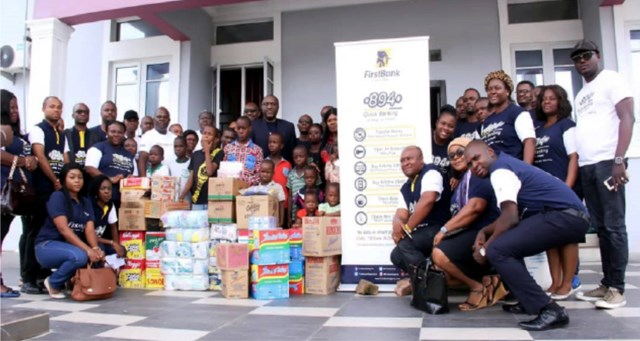Business
Financial Inclusion: ‘How First Bank, Others Are Empowering Women’

Unarguably, women play an important role in the economic growth and development of any nation.
From retail business to entrepreneurship, women make significant contributions to financial transactions, as recently acknowledged in a World Bank study, which noted that women controlled over 20 trillion dollars transactions worldwide.
However, the study titled, “Unrealised Potential: The High Cost of Gender Inequality in Earnings,” revealed that several countries were losing 160 trillion dollars due to differences in lifetime earnings between women and men.
The bank’s Vice President and Treasurer, Ms Arunma Oteh, explained that the figure represented an average of 23,620 dollars lost per person in the 141 countries captured by the study due to inequality in earnings between women and men.
According to Oteh, the study revealed that globally women accounted for only 38 per cent of human capital wealth as against 62 per cent for men.
“In fact, in low- and lower-middle income countries, women account for a third or less of human capital wealth. The losses in wealth from inequality in earnings between men and women vary by region.
“The largest losses, each between 40 trillion dollars and 50 trillion dollars, are observed in East Asia and the Pacific, North America, and Europe and Central Asia,” she said.
Oteh noted that women were important for economic development and were the economic powerhouse for society today, hence the need for concerted efforts for women empowerment.
The shortfall in earnings between women and men, and the need to bridge the gap, is said to be a concern in many countries around the world, particularly as governments are also facing funding challenges.
In Nigeria, some financial institutions have risen to the occasion by proving financial products tailored toward empowering women, as a component of the general financial inclusion drive.
For instance, First Bank of Nigeria Limited, realising that women are the most dynamic and fastest growing economic force in the world, launched an initiative tagged FirstGem to provide financial solutions to women.
The managing director of the bank, Dr Adesola Adeduntan, Chinyere Hoel-while marking the second anniversary of the scheme recently, said over N57.067 billion was given to 81, 687 individuals and businesses owned by women in Nigeria.
He said FirstGem was a product suite that cut across women of all generations irrespective of age, location and social status.
He explained that it was created with an understanding of the uniqueness of women and the need to bridge the identified gaps in their lives, both in corporate Nigeria and in the entrepreneurial space.
To him, the focus of the scheme is to harness and financially mobilise the growing percentage of women in the country by creating an attractive and convenient product that suits their business aspirations, lifestyles and expectations.
Adeduntan said FirstGem had provided opportunities for women to create a savings plan and culture that guarantees them financial freedom and safety for the future; enabling them to save towards specific targets.
“FirstGem was launched to drive financial inclusion and all-round development of women through gender-advancement programmes wrapped around savings culture, financial literacy, loan management and building Investment portfolio.
“FirstGem has created an avenue for women to have access to soft loans to support their aspirations and economic development in their different fields of endeavour.
“It has enhanced women’s lifestyle needs – FirstGem account holders enjoy tremendous discounts from retails stores and life-style improvement outfits in strategic partnership with FirstBank,” he said.
Adeduntan said the bank had continued to use the platform of FirstGem to organise and participate in many women empowerment programmes due to the impact of women’s contribution to economic development.
The managing director said the bank also created FirstGem Online Community, an online platform that provided information on a wide range of issues affecting women from lifestyle, politics, business ideas, skills acquisition, among others.
He said the online community also featured blogs and videos of high-profile women of influence, providing mentorship nuggets and answers to a variety of life, career and business/social issues as guides for women.
In all, he said the bank would continue to put its customers and stakeholders at the heart of its business with the introduction of products and services that would withstand the test of time.
“For over 124 years of our existence, we have focussed on providing excellent financial services to meet the needs of our esteemed customers.
“We continue to improve on our products and also create new ones that suit their specific financial needs.
“The reason why we have been successful is our ability to invent, reinvent and reinvent ourselves.
“You can only be successful like that when you put your customer at the centre piece of all your actions. That is the secret of our success,” said Adeduntan.
Access Bank similarly introduced the ‘W Initiative’ to empower and inspire women in business. The bank said empowering women was truly at the heart of its strategy.
Group Head, Product Sales of Access Bank, Mrs Ope Wemi-Jones, recently said the bank trained 75,000 women in 81 locations in 19 states on finance, education, SMEs, event planning among others.
She said the bank had continued in its commitment to help women overcome the cultural and financial barriers toward harnessing their potential both as women and business owners in Nigeria.
Also, Polaris Bank, formerly Skye Bank, as part of its commitment to empower retail business women in the country, launched Webnar 2.0 for Polaris Pearl subscribers.
Pearl Initiative is a-best-in-class programme which offers women real value-added beyond finance, taking into account the holistic needs and concerns of women in their quest to actualise their potential either as entrepreneurs, professionals or stay-at-home mums.
Such interventions have fueled the hope that, indeed, women, particularly Nigerian women, would in no time make significant contributions to the nation’s growth and restore it to the path of development.
Joel-Nwokeoma writes for News Agency of Nigeria (NAN)
Chinyere Joel-Nwokeoma

